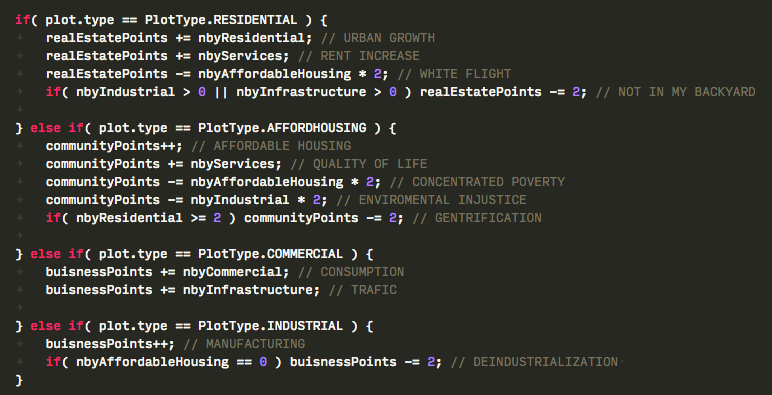Now that the basic rules for visualizing the city as tiles work, next comes the actual urban planning.
Generative Proposals
For now, I’ve settled on using Molleindustria’s rules from MultipliCITY to create a basic scoring system for the AIs. The AI looks through all of the tiles and finds the ones where they would benefit the most from either developing on new land or using eminent domain to evict existing residents or businesses for a new development. If I add an extra property to the tiles, maybe ‘productivity’ or ‘maintenance’, I can better balance for eminent domain.
Before we generate a proposal, the system has already calculated how much each tile is worth to each group, the Real Estate Developers, Businesses, and Community Organizers. Next, the system generates a weighted random list of developments that will be proposed. By having this be random, I account for that though all the groups may want a school somewhere, only once a variety of factors (basically just funding) line up can a school be actually proposed on a lot. Next, the groups need to pick which developments they want to propose. Each group can only propose certain tiles. For instance, Real Estate Developers can’t propose where to put an industrial development, but they would be disappointed if it’s near residential development.
- Real Estate: Real Estate, Service
- Buisness: Commercial, Industrial, Infrastructure (all unique)
- Community Organizers: Affordable Housing, Service
This means that perhaps services will be contested (with a contesting mechanic [hard!]) or each group will get a certain percentage of all service developments (easier).
Voting
For voting, I have a system where the player has a certain number of votes to spend on several proposals. Proposals either need points spent on them to pass or are already passing and you would need to spend points to fight them. I’m thinking of using a timer to force players to make quick decisions on whether each development is good or bad. The later the game goes, the more hectic it will get and though you’ll have more votes, you’ll have more proposals and have to make rash decisions.
